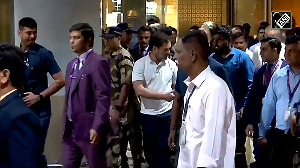If April-May, which saw the Lok Sabha election, set a new trend in Indian politics, the second half of June proved no less important for the party that lost them -- the BJP.
Its June 22-24 national executive meeting will go down as a story of incomprehension of and bitterness at defeat, mutual recrimination, washing of dirty linen in public, organisational disarray, ideological confusion and a grave leadership crisis. In particular, it signifies the party's utter failure to comprehend the causes of its electoral debacle, regain self-confidence, and devise a strategy to return to the political centre-stage.
The Mumbai meeting showed the BJP in acutely uncomplimentary light. It emerged from it badly mauled, with visible divergences between Atal Bihari Vajpayee and L K Advani amidst the washing of dirty linen in public. The BJP is now ripe for a virtual political takeover by the RSS and its hardline associates. Its 'tallest leader,' it turns out, is only a dwarf.
Vajpayee has lost his touch and his mystique. His stature has shrunk to a fraction of its size before the elections. Once a master of tactical manoeuvre and shrewd rhetoric, he has fallen to the level of the run-of-the-mill politician given to serious miscalculation, thoughtless statements and less-than-mature retractions.
Vajpayee fired the first salvo in the current power-struggle on June 13. In Manali, he blamed Narendra Modi for the BJP's poor electoral showing across the country, and said not removing him from Gujarat was 'a mistake.' Vajpayee declared the issue would be taken up in the national executive. He was promptly rebuffed by party President M Venkaiah Naidu and the RSS -- a sign of his now-reduced importance for the Sangh Parivar. Two days later, Messrs Ashok Singhal, Giriraj Kishore, Vishnu Hari Dalmiya and Omkar Bhave, VHP and RSS leaders in their late 70s and 80s, launched a broadside on the Vajpayee-Advani duo. They demanded their resignation and a public admission that the BJP was defeated because 'they discarded Hindutva-related issues.' They also asked that the party should fix a 'retirement age' for its top leaders.
It's laughable that these old men should demand a 'retirement age.' But the cruellest irony was that their line -- of attributing the BJP's defeat to its departure from hardline-Hindutva -- was accepted by the party 10 days later! Evidently, Vajpayee misread the party's mood and overestimated his own clout. Over the past six years, he got used to having his way in the party -- whether by sulking at the mildest of criticism, or by cracking the whip on apparatchiks. Thus, last year, he snubbed Naidu over the vikas purush-loh purush formulation and made him retract it inside 24 hours. Earlier, he refused to sack principal secretary-confidante Brajesh Mishra despite intense pressure from Advani and the Parivar.
However, Vajpayee's strength inside the BJP derived primarily from his leadership of its parliamentary wing, and secondarily, from his close relations with NDA allies, for whom he was a cementing bond. He has lost the first position. And the allies have shrunk to less than half their size. Only three matter at the national level: the Shiv Sena, JD(U) and Shiromani Akali Dal. (The largest partner, Biju Janata Dal, has no national agenda, profile or interest.) None of them pulls much weight; they cannot be used to counter the BJP. Vajpayee clearly overplayed his hand. Once snubbed for doing so, he declared Mr Modi's removal was an 'old issue' -- in total genuflexion to the party's hardening stance.
This should put paid to the impression that Vajpayee is serious about opposing an RSS takeover of the BJP, or at least creating an alternative power centre within the Sangh combine. Had he been serious, he would have put up a fight by carefully cultivating and gathering support for his stand. Instead, he staged undignified theatre in Mumbai -- by first saying that he wasn't going to lead the party ('enough is enough'). A day later, he said this statement was meant to be 'a joke.' The ultimate height of absurdity was that he ended up entertaining Modi for breakfast!
This was typical of Vajpayee's deeply inconsistent, declamation-followed-by-retraction, behaviour -- witness his 2000 statement declaring himself a swayamsevak in New York, but then 'clarifying' that he meant being a 'servant of the nation'; his distancing himself from his characterisation of the Babri demolition as a 'manifestation of nationalist sentiment'; or his 2002 about-turn at the Goa national executive over removing Modi from Gujarat's chief ministership.
Mr Vajpayee could cover up some of his inconsistencies thanks to an indulgent media -- simply because he was in power. That's no longer the case. Vajpayee cannot even pretend now that he is a man of conviction, or a 'moderate' or 'liberal.' He is as steeped in Hindutva as any other swayamsevak. It's just that he favours a less loud, 'in-your-face,' softer, approach to the same goal. Today, even that's not acceptable to his party.
In Mumbai, the BJP didn't undertake serious introspection. Rather, it looked for scapegoats and further hardened its ideological stance. It denied reality -- in particular, that India's basic political coordinates have changed and it's seriously out of tune with them.
The last election turned on two axes: livelihood issues or concerns with equity, and rejection of cynical politics centred on ethnic-religious identities. Yet the BJP trotted out question-begging explanations for its defeat like 'overconfidence' and 'complacency,' or its 'image' as a party of the affluent, given to 5-star indulgence -- as if that image were unrelated to reality. What's truly surreal is that despite this, the national executive was held in a 7-star hotel on the Powai Lake, where delegates had free access to 7 restaurants with different cuisines, plus a gymnasium and sauna.
The 'serious' explanation that prevailed in Mumbai was advanced by margadarshak and arch-ideologue Advani. This was the RSS-VHP line that the BJP lost because it neglected its 'ideological constituency' formed by three legs: 'our karyakartas, our ideological Parivar and our social support base.' It's of course futile to ask the BJP whether and why it neglected this triad. After all, it drafted in Modi and Uma Bharati among its star campaigners. Vajpayee shared the election platform with Modi more than once. The RSS canvassed for the BJP door-to-door in Uttar Pradesh. Modi and Bharati don't have to speak the language of Hindutva, Ayodhya and 'foreign origins.' They personify Hindutva.
Such 'explanations' are not based on sound logic, but on circular reasoning derived from pure dogma: we lost because we didn't win, and we didn't win because we tried to redefine ourselves, to become what we aren't. So return to hardline Hindutva and we'll win again. The allies will come rushing back to us. New ones will join in: Ajit Singh, Karunanidhi, Paswan
The BJP is day-dreaming. It cannot possibly retain its allies or recruit new ones by returning to its unique 'ideological constituency.' Hardcore Hindutva will scare them away. The BJP's entire past strategy of capitalising on public disenchantment with the Congress by building successful alliances with regional parties has now become unworkable.
Today, the public is willing to give the Congress-UPA another chance because it's offering a New Deal: a compassionate government pledged to correcting gross disparities in society and economy, and to a return to pluralism along with a rejection of communal bigotry and fundamentalism. By building regional alliances, the Congress has re-inserted itself into the space BJP occupied to its great advantage.
The BJP is drifting rudderless towards overt, strident communalism. Its first-generation top leadership is no longer in full, undisputed command. Its moral authority has eroded although Advani has improved his position. And the competition among its second-rung leaders is as yet unresolved. In any case, they are too many: Messrs Naidu, Mahajan, Jaitley and Bharati and Sushma Swaraj. Clarity will emerge only after the Maharashtra assembly elections, due in September.
The BJP-Shiv Sena calculates that the Ishrat 'encounter' killing may polarise opinion in favour of Hindu communalism; and Congress-NCP tensions could further help it. This may be wishful thinking. Most people are repulsed by the 'encounter' and the police's contradictory accounts of it. The Congress-NCP will probably do very well if they rope in the BSP which took away five percent of the secular vote during the Lok Sabha election.
Nationally, the BJP has lost its political advantage. If it clings to a narrow Hindutva platform, its appeal will further decline. The UPA is making some excellent moves and taking worthy measures. The Common Minimum Programme and the National Advisory Committee pertaining to it are good examples. The Committee has some outstanding members like Aruna Roy, Jean Dreze, Madhav Chavan and N C Saxena. They could provide critical evaluation and sound advice on the government's policies and help keep it on course. If Manmohan Singh's economic team handles the Budget well, popular support for the UPA will surge. The BJP, then, could find itself on the margins for a long, long time.






 © 2025
© 2025